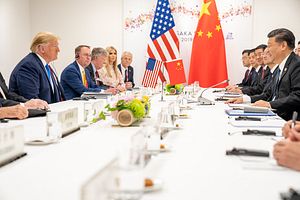The year is not over, but it’s safe to say that 2020 has been a watershed. Even so, it may be difficult to grasp just how consequential the last several months have been for U.S.-China relations. As the many crises of 2020 recede into the past, it will become increasingly clear that we witnessed the most important sea change in U.S.-China relations in 50 years. Critically, this was the year that the tide of public opinion in the United States turned against China.
The two global powers have been the best of “frenemies” for decades. But the issues that have challenged the relationship in the past – human rights, democracy, territorial claims, and espionage – have snowballed this year. Some of this is deliberate, a product of President Donald Trump’s aggressive China policies. But the COVID-19 pandemic, and more importantly, China’s lackluster public relations and crisis management have led to a downward spiral in U.S. and global public opinion of the Middle Kingdom. Future American leaders (at least those who are politically savvy) will follow this trend in public opinion, and the needle will continue to move from cooperation to competition. Declining public approval of America’s greatest competitor means that even if Joe Biden is elected president, he will be unable to reverse course.
Over the last decade, even as China asserted itself more strongly in places like the South China Sea and Hong Kong, Americans continued to debate whether China was really a threat or not. This was reflected in American public opinion: Following the 2008 Beijing Olympics and shortly before Xi Jinping rose to power, Americans largely held a positive view of China. But a confluence of events this year has brought a series of festering issues to the forefront. First, the pandemic itself has been a huge blow to Americans’ perceptions of China. According to recent polling by the Pew Research Center, an incredible 78 percent of the American public believes that China is to blame for the spread of the virus. Second, even in the past when the public’s view was largely positive, China’s repressive policies were no secret. But it has been at least 30 years since this repression was displayed as nakedly as it was in Hong Kong this summer. Combined with growing revelations of the (mis)treatment of Uyghur Muslims in the western provinces of the country, the CCP is winning its internal battles while losing the global PR battle.
In fact, the drop in American public opinion coincides with significant blows to China’s image around the world. As Denny Roy has pointed out, China was facing self-induced backlash in many countries even before the pandemic began. As a result, China has undermined its own stated desire to wield “soft power” in international relations. Public perception has tanked, not just in the United States where Beijing was always viewed as a competitor, but even in areas that have offered China wide latitude, such as Africa and Central Asia. And contrary to the Trump administration’s focus on Chinese economic threats, the average American’s concerns about China are not primarily economic. Instead, Americans believe that China poses the greatest threat in areas like human rights and the environment – issues of global concern.
If American public opinion remains at such historically low levels, we are likely to see more American politicians abandoning the pretense of a “mostly cooperative” relationship with China. Trump’s aggressive stance on China is therefore not fleeting. Biden recently characterized Hong Kong’s new security laws as a “death blow” to freedom and the country’s treatment of Uyghurs as “genocide.” If you need any more evidence that the tide of American public opinion has turned against China in 2020, consider that the two presidential candidates have accused each other of “fealty to Xi Jinping” and having an agenda that is “Made in China.”
In short, it is no longer politically wise to characterize China as a partner or friend. This does not necessarily mean that war is more likely. With recent cooperation on the Phase One trade deal, it’s clear that the United States and China still see mutual economic benefit in a peaceful relationship. And it’s possible that China could reverse its current public image in the U.S. in a number of ways. For now, though, such a reversal seems unlikely. The next decade for the United States and China is going to look and sound very different than the last.
Dr. Justin Conrad is the Gary K. Bertsch Director of the Center for International Trade and Security (CITS) at the University of Georgia and the author of Gambling and War: Risk, Reward and Chance in International Conflict.

































